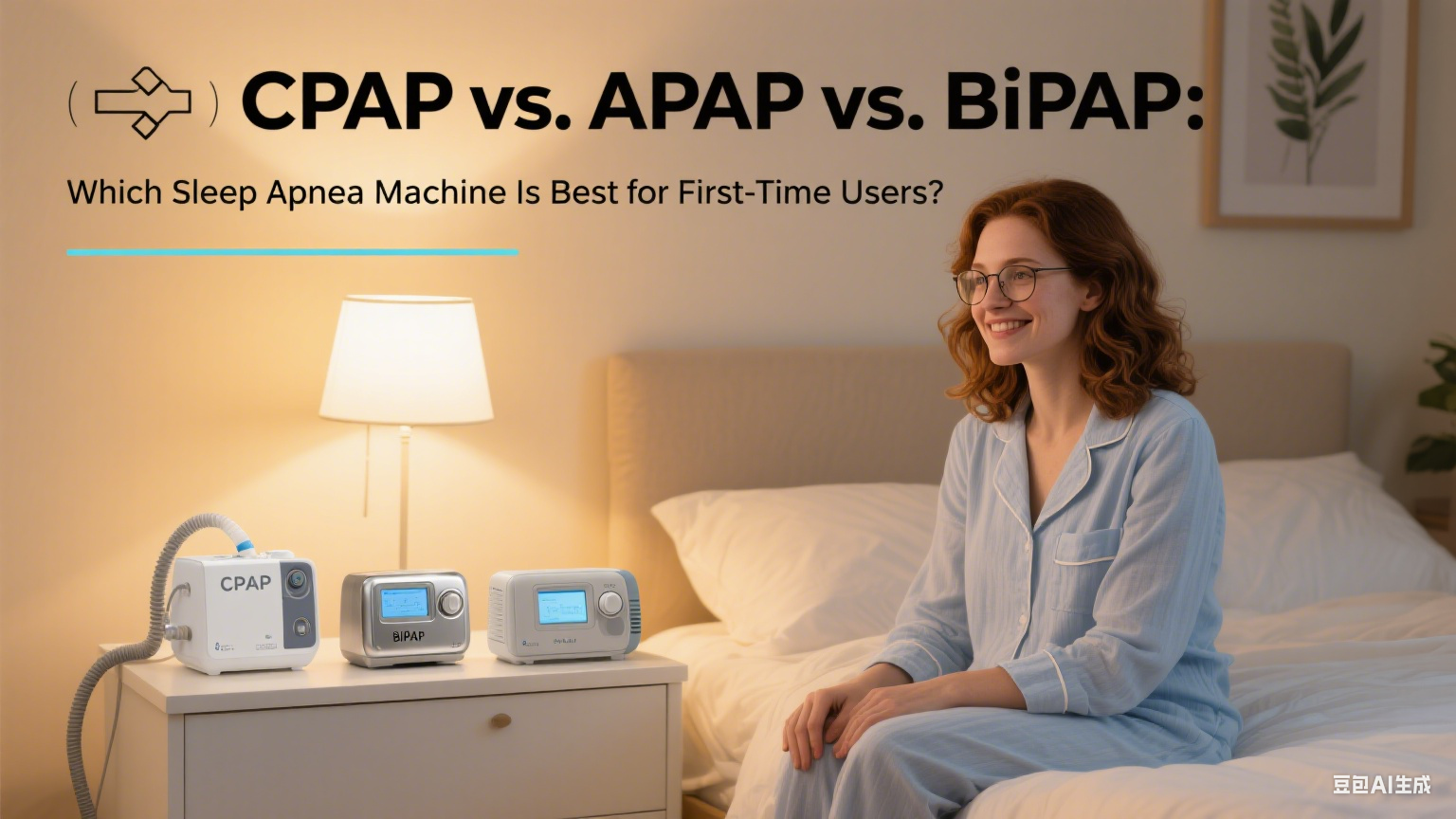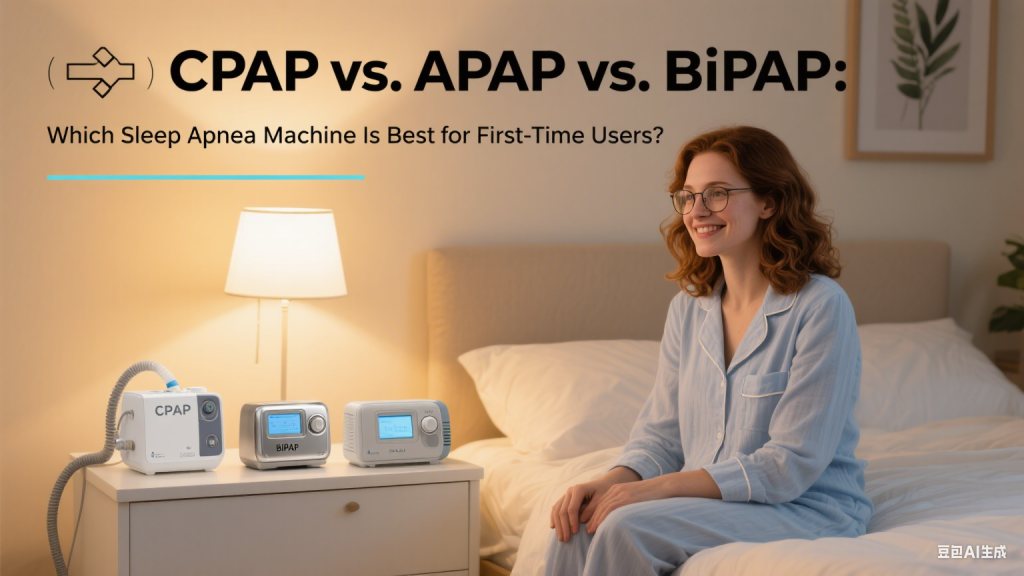CPAP vs. APAP vs. BiPAP: Which Sleep Apnea Machine Is Best for First-Time Users?


Introduction
Sleep apnea is more than just loud snoring—it’s a serious sleep disorder that disrupts breathing and impacts overall health. Left untreated, it can lead to heart problems, daytime fatigue, and even stroke. Thankfully, positive airway pressure (PAP) machines have become the gold standard for treatment.
But if you’re a first-time user, the variety of machines can feel overwhelming. Should you start with a CPAP, APAP, or BiPAP machine? Don’t worry—we’re breaking down the differences in simple, beginner-friendly terms so you can make an informed choice.
What Is Sleep Apnea and Why Does It Require Treatment?
Sleep apnea occurs when your airway becomes partially or completely blocked during sleep. The most common form, Obstructive Sleep Apnea (OSA), causes repeated breathing interruptions that lower oxygen levels.
Untreated sleep apnea increases the risk of:
- High blood pressure
- Heart disease and stroke
- Daytime fatigue and poor focus
- Type 2 diabetes
That’s why doctors often prescribe PAP therapy, which uses pressurized air to keep your airway open.
What Is a CPAP Machine?
CPAP stands for Continuous Positive Airway Pressure. It delivers a steady stream of air at one fixed pressure throughout the night.
✅ Pros:
- Most commonly prescribed
- Simple to use and widely available
- Effective for most sleep apnea cases
❌ Cons:
- Some users find constant pressure uncomfortable
- Requires mask adjustment for best results
What Is an APAP Machine?
APAP stands for Automatic Positive Airway Pressure. Unlike CPAP, it adjusts air pressure automatically based on your breathing patterns.
✅ Pros:
- More comfortable for many users
- Adjusts to your needs throughout the night
- Often recommended for people who struggle with CPAP
❌ Cons:
- More expensive than CPAP
- May not be necessary for mild cases
What Is a BiPAP Machine?
BiPAP stands for Bi-level Positive Airway Pressure. Instead of one constant pressure, it provides:
- A higher pressure when you inhale
- A lower pressure when you exhale
✅ Pros:
- Great for severe sleep apnea
- Helpful for people with additional conditions (like COPD)
- Easier breathing experience for some patients
❌ Cons:
- Highest cost among PAP machines
- Usually prescribed only when CPAP or APAP isn’t enough
CPAP vs. APAP vs. BiPAP: Key Differences
| Feature | CPAP | APAP | BiPAP |
|---|---|---|---|
| Pressure | Constant | Automatic | Two levels (inhale/exhale) |
| Comfort | May feel rigid | More adaptable | Very comfortable for complex cases |
| Cost | $ | $$ | $$$ |
| Best For | Most first-time users | Those needing flexibility | Severe cases or added health conditions |
Which Machine Is Best for First-Time Users?
For most beginners, CPAP is the first choice—it’s simple, effective, and cost-friendly. If you find constant pressure uncomfortable, APAP may provide more flexibility and comfort. BiPAP, however, is typically reserved for patients with more severe sleep apnea or other respiratory issues.
The best machine for you will depend on:
- Your doctor’s prescription
- Comfort during sleep
- Your budget and insurance coverage
Tips for Adjusting to Your First PAP Machine
- Get the right mask fit: Comfort matters—try different styles if needed.
- Start slow: Wear the mask while awake to get used to the sensation.
- Keep it clean: Regular cleaning prevents bacteria buildup and extends machine life.
- Stay consistent: It may take a few weeks, but regular use leads to better sleep.
- Consult your doctor: Don’t give up—adjustments can make a big difference.
Conclusion
Choosing between CPAP, APAP, and BiPAP may seem complicated, but it really comes down to your unique needs. For most first-time users, CPAP is a reliable and affordable starting point. If you need extra comfort, APAP could be worth the investment, while BiPAP is best for more complex cases.
The good news? With the right machine, you’ll breathe easier, sleep better, and wake up refreshed—ready to take on the day.
FAQs
Q1: Is APAP better than CPAP for beginners?
Not always. APAP is more flexible, but many first-time users do well with CPAP.
Q2: What’s the difference between BiPAP and CPAP?
BiPAP provides two pressure levels (inhale/exhale), while CPAP uses one constant pressure.
Q3: How do I know which sleep apnea machine I need?
Your sleep study results and doctor’s recommendation will guide the choice.
Q4: Can I switch from CPAP to APAP later?
Yes, many patients start with CPAP and upgrade to APAP if comfort is an issue.
Q5: Are CPAP machines uncomfortable to use every night?
It takes time to adjust, but the right mask and settings make a huge difference.
















